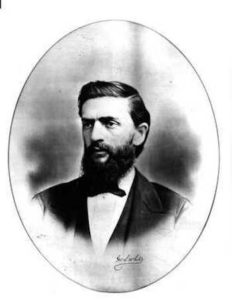
George L. White
*George L. White was born on this date in 1838. He was a white-American soldier, missionary, and choral administrator.
Born in Cadiz, New York, George Leonard White was the son of a blacksmith who played in a local band. He attended public school until age fourteen and moved to Ohio when he was twenty. Although not a singer, White developed a talent for interpreting music and began directing choirs at various schools and churches in Ohio, where he founded a black Sunday school. He enlisted in the Union Army during the American Civil War, and his time at Gettysburg, Chancellorsville, and Chattanooga nearly destroyed his health.
After being medically discharged from the army, he joined the Freedmen’s Bureau in Nashville, a city crowded with impoverished former slaves. When the Fisk Free Colored School opened under the auspices of the American Missionary Association (A.M.A.) in 1866, White volunteered to teach music and penmanship. Recognizing that music had served as an important mode of resistance and consolation during his students’ enslavement, White organized a choir. In 1867, his group performed at Nashville's Masonic Hall, garnering $400 toward the performers' education.
Still, only in his 20s, White was hired by Fisk University as its treasurer, making him responsible for collecting tuition from newly freed families and keeping the school's creditors at bay. White continued to work with the choir, selecting the best singers from a voice class at Fisk. With the help of sixteen-year-old Ella Sheppard, whom White hired as an assistant in 1868, the choir performed all over Tennessee, giving shows combining drama, recitations, gymnastics, piano, and singing. Though White contributed his meager savings toward Fisk's upkeep, by the autumn of 1871, the school was deep in debt.
White proposed taking the best of his singers on a fundraising tour of the North, but the A.M.A. and Fisk's new president, Adam Spence, opposed the idea as vulgar, risky, and born out of White's self-interested opportunism. White's singers believed in him, however, and on October 6, 1871, the Jubilee Singers departed from Nashville with his troupe of singers "to sing the money out of the hearts and pockets of the people." The troupe had planned to stick mainly to popular songs but soon began to receive excited praise for the Black spirituals they sang as encores.
Many Blacks were uneasy with the performance of sacred music for the amusement of white audiences. Nevertheless, White collected as many spirituals as he could, calling upon his singers to teach him the music their parents and grandparents had sung as slaves. Soon, the singers became known for these songs, and White's naming of the group after the biblical year of Jubilee helped secure their role as unofficial representatives of the Black religious experience to white audiences.
Eventually, he was forced to retire and moved to Fredonia, New York, with his second wife, Susan Gilbert, who had also been a teacher at Fisk. Through the years of concerts, he and the Jubilee Singers raised $150,000 for the University. Today, that would be equivalent to two and a half million dollars. Ironically, despite all his efforts to raise money for others, he died a poor man. His wife was forced to find work as a housekeeper since his health was so broken.
On November 8, 1895, George White suffered a massive stroke and died at the age of 58. He is buried in Fredonia. At his memorial service, the Jubilee Singers sang "Steal Away" and "We Shall Walk Through the Valley". Georgia Gordon, one of his singers, said: "He was the true and tried friend of the singers and a staunch friend of the negro race." Many music experts credit George White with saving many of the spirituals and hymns of the slaves and keeping them from oblivion.